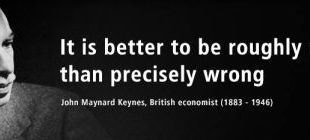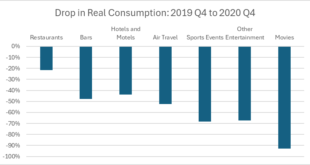from Asad Zaman and WEA Pedological Blog . . . conventional modern textbooks of economics do not correctly describe monetary economies.. . . For instance, a popular textbook by Mankiw states that: . . . I am planning to write a textbook on monetary economies. I will draft it section by section and chapter by chapter, and put down the drafts here for feedback and comments. The first section is given below – it is an introduction to the topic, and provides some motivation for the study,...
Read More »A future threat has become a present reality and time is against us
from Jamie Morgan and RWER issue 106 ‘How can we construct an economics consistent with the biophysical limits to economic growth?’. As any ecological economist is aware, this is a foundational issue not an afterthought chapter tacked on to the end of a textbook or delegated to a sub-disciplinary specialist who can ‘deal with that for us’. Doing either of those has been part of the problem. Mainstream economics takes as its primary focus the microeconomics of price signalling in systems...
Read More »Econometric modeling and inference
from Lars Syll The impossibility of proper specification is true generally in regression analyses across the social sciences, whether we are looking at the factors affecting occupational status, voting behavior, etc. The problem is that as implied by the three conditions for regression analyses to yield accurate, unbiased estimates, you need to investigate a phenomenon that has underlying mathematical regularities – and, moreover, you need to know what they are. Neither seems true … Even...
Read More »I fear many economists are too caught up in their own survival
from Tony Lawson and RWER current issue I fear, though, that many economists, even some that present themselves as radical thinkers, are too caught up in their own survival (or promotion ambitions, etc.) in the academy to move in a direction of any relevance. The convenient, often seemingly compulsory, recourse is to stay on the safe and (in truth far too) easy (if seemingly impressive to the non-mathematical) path to nowhere that is economic modelling. Already numerous self-styled...
Read More »The aim of an economy should . . . . .
from Clive L. Spash and Clíodhna Ryan and RWER issue 106 The aim of an economy should not be to grow so that a welfare State can be funded to ameliorate the social, health and ecological impacts of growth, but rather to engage directly in social provisioning that avoids exploitation and deliberate harm. Long ago, Kapp (1970) emphasised the social ecological imperative for reorienting economics towards policies addressing needs, the requirements of human life and social minima. This...
Read More »The loss of confidence in economists’ analyses
from Lars Syll Ainsi, la crise de 2008 a créé la surprise dans les rangs des économistes influents, qui croyaient voir le monde entrer au XXIe siècle dans le temps de « la grande modération » – c’est-à-dire la prévention des mouvements économiques erratiques grâce au pilotage « scientifique » des politiques monétaires … Cet épisode a sans conteste révélé une défaillance sévère du savoir économique … Pourquoi cette perte de confiance envers les analyses des économistes ? Nous vivons...
Read More »“Economics”, our master narrative manufacturing our demise
from Richard Parker and RWER issue 106 “If economists could manage to get themselves thought of as humble, competentpeople on a level with dentists, that would be splendid.” — John Maynard Keynes I cite The Master because I don’t think economists, working within “economics” in its present form can really address the crisis of limits we’re facing—but I do think men and women who work as economists can. But only if they behave like dentists. Let me explain. To review the last few years’...
Read More »The great economy Trump left Biden
from Dean Baker We have been seeing numerous stories in the media about how people support Donald Trump because he did such a great job with the economy. Obviously, people can believe whatever they want about the world, but it is worth reminding people what the world actually looked like when Trump left office (kicking and screaming) and Biden stepped into the White House. Trump’s Legacy: Mass Unemployment The economy had largely shut down in the spring of 2020 because of the pandemic. It...
Read More »Alternative provisioning systems
from Clive Spash and Clíodhna Ryan and RWER issue 106 Economics fails not merely to account for biophysical limits to growth but to account for actual and potential alternative provisioning systems. Instead, talk of ‘the economy’ makes an implicit ontological claim that there is only a singular form of modern economy: the capital accumulating, price-making market economy. Economics has then become limited to a discussion of market capitalism and how it can be maintained in light of its...
Read More »We’re killing it.
Right-wing ranters in my Twitter timeline are pooh-poohing the whole climate discussion without doing their homework. So, here’s a little reader to aid and abet (sorry, early retired teacher and that all).Let’s start at the beginning:1. CO2 is measured at the Manua Loa station. Results are clear, robust, and stark: CO2 is increasing. And no, CO2 is not ‘following temperature’ as the latest lazymeme from the lazyright wants to have it. It’s following us. We’re causing it. A ‘mass...
Read More » Real-World Economics Review
Real-World Economics Review




